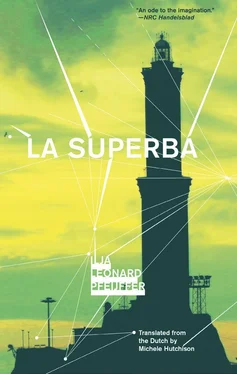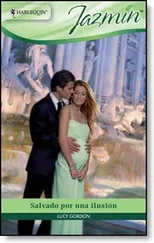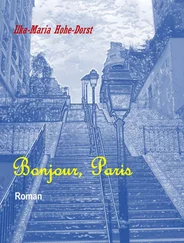44.
And one evening, when I came home, I found a letter. It wasn’t in an envelope. It was nothing more than a single, folded sheet that had been shoved under my front door.
“Dear Leonardo, I’m so sorry things turned out the way they did. Like I said the last time we saw each other — your problem is that you live too much in your fantasy. You think you understand things, but everything you understand you only understand in your own thoughts. If you paid more attention to reality, none of this would have had to happen.
“I was in love with you, Leonardo. I loved you. But those feelings were so strong and so new, they confused me. That’s why I needed time. That’s why I asked you to leave me alone for a couple of weeks. And do you know what? I had a really good think. I began to understand that the things you said about Francesco were right. Or didn’t say but thought. I began to understand that I wasn’t obliged to stay with someone who pushed me down the stairs. I began to understand that I had the right to make my own choices and that I could also choose adventure. Nobody could stop me.
“And you know what, that very day, two days before the derby, I had made up my mind. I had decided to choose you. And I broke up with Francesco, however difficult that was. I dreamed of being with you and maybe even going to your country one day. I dreamed of learning your language, being able to read your poems and beginning a new life in the north with you one day. I couldn’t wait to tell you.
“And the next morning you turned up with her. With that blonde girl who was the opposite of me in every sense. And I saw the two of you talking in your own language and looking at each other. You paid absolutely no attention to me. You seemed to have completely forgotten me. Or you were deliberately ignoring me. And during the derby I saw the way you laid your hand on her shoulder. And after that on the Piazza delle Erbe, I saw how you were talking like two people in love. I saw you kiss. And after that I followed you. I watched you walk back to your house, hand in hand, that same house where I lay in the moonlight in your hands and where in my dreams I had wanted to live with you until we went to your country. How could you be so heartless, Leonardo? How could you forget me so quickly?
“Well, that’s what I wanted to say. Now you know.
“And, oh yes, one more thing. Feel free to go to the Bar of Mirrors. I don’t work there anymore. I handed in my notice this morning.”
FIRST INTERMEZZO. We All Live in a Yellow Submarine
1.
It was Don’s birthday and there was no way we could forget it. He was turning seventy-three. That morning I saw him sitting with Boar — that’s Elio’s nickname, the manager of the Schooner, a restaurant on Salita Pollaiuoli, you go past the Bar of Mirrors and it’s a bit further along, toward Via San Bernardo and San Donato. Boar has a simple strategy. No one can smoke in his restaurant unless it happens to be empty. That’s why the restaurant is closed pretty much all day. Boar stands there in his dirty wife-beater, puffing away behind the counter under the no smoking sign. Sometimes the door is open to let in some fresh air. Unsuspecting, high-spirited tourists, wandering in for a bite to eat in the world famous Schooner restaurant, are bundled off by the Boar. Chiuso . Closed. Shut. No, no restaurant today. Because otherwise he’d have to get changed, clear the ashtrays from the tables, look for the menus, work. He’d rather close the door again and turn up the music. Ella Fitzgerald. Listen to this. Sarah Vaughan. And then something with a sousaphone solo. His vest turns as yellow as his fingers, steeped in nicotine. Wine. Beer. Gin and tonic. Don. And anyone else in there has to be a friend of either Boar’s or Don’s. Even at eleven in the morning.
Italian humor mainly consists of laughing very loudly after you’ve told a joke and then raising your voice and re-telling the same joke three times over. Sarah Vaughan sang a song called “You Are My Honeybee.” Boar, who, unlike the rest of them, understands a bit of English, translated the line into Italian. “She sings, ‘You are my honeybee.’ That means he comes along and pricks her, know what I mean?” He accompanied this with a vulgar gesture. While there was laughter around the bar, he raised his voice, clearly as pleased as punch with his minor success, and continued, “You are my honeybee. Get it? He has a sting…He pricks her with his…you know. And then she sings that he’s her honeybee. Get it? Get it?! You are my honeybee. Unbelievable. That’s what she’s singing. And he’s pricking her…” Again and again he made the same obscene gesture. And if anyone else tried to chime in, he defended his personal success by repeating the same thing even more loudly. An Italian party consists of telling as many jokes as possible, as often as possible, and drowning out any others trying to do the same.
And among it all, Don floated, flourished, triumphed, and warbled like a jamming device. He danced along on a giant woolly cloud of gin and tonic. It was his birthday for sure. He had been in Genoa for more than twenty years by now, and he still hardly spoke any Italian, but he knew the obscene gestures as well as the next person. And as soon as the next girl came tripping in to wish him a happy birthday, he spread his arms and sang, “You are my honeybee,” to Boar’s great amusement and that of all the other Italians at the bar. Don knew how to make friends in Genoa, or anywhere else in the world — he didn’t care, as long as they served gin and tonic with as little tonic as possible, and as long as he was given special dispensation to smoke with the barman in a bar where you couldn’t smoke. He slapped women’s bottoms, squeezed their breasts, and laid his head on their laps. Clearly, a seventy-three-year-old alcoholic with an English accent could get away with a lot.
“We’re just as scoundrelous as all those Italians,” he said to me in English.
“We’re anthropologists,” I proposed.
“Here’s to anthropologists! Let’s drink to that! Cheers, big ears!” And then he began to dish up a long, priceless anecdote about an anthropologist he’d met in Burma or Malaysia. I’d heard this anecdote ten times already, but each time I’d been denied the punch line because of the arrival of yet another woman needing to be serenaded, hugged, or felt up.
At the time, Don was my dearest friend in the labyrinth. He was the only one who, by getting profusely lost every day, never got lost. His world had shrunk to a handful of bars near his hotel on Salita Pollaiuoli and although he regularly couldn’t find his way back to his hotel from the Piazza delle Erbe, which his room looked out on, in his unbroken delirium, he was the most constant, stable, reliable, and most realistic of all the people I knew. And I don’t mean that as a funny way of saying that he was predictable and easily locatable at any given moment of the day. He was the only one who understood. He didn’t live in a fantasy world; because in all its modesty, he had made a beautiful fantasy come true: drinking himself to death, laughing and dancing among cheerful sweet nothings, smiling Italians, and a few bottoms to slap and tits to squeeze. He no longer had any illusions. Instead, he had decided that every day was a party. Every day was Don’s birthday for Don. Grande Don .
2.
His real name was Donald Perrygrove Sinclair, but because he was the godfather of the square and, on a busy night, hundreds came by to kiss his hand, he was called Don. He was the English Professor. The little Italian he spoke he pronounced with such a heavy Oxbridge accent that he turned himself into more than one English Professor: the way he said it, it sounded like Il Professori Inglesi . And everyone copied him, because it seemed to fit. He was too magnificent to make do with the banal singular.
Читать дальше












